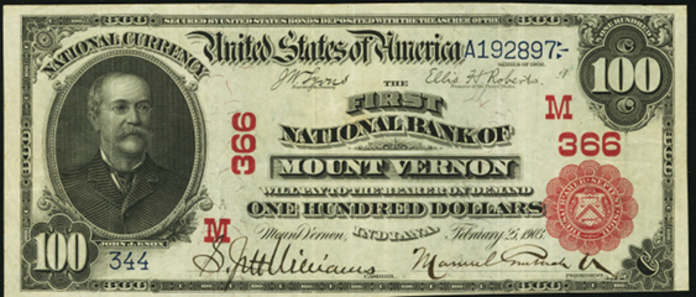One Hundred Dollar Notes › Nationals › 1902 One Hundred Dollar National Bank Notes › Connecticut Charters › 1902 $100 Thomaston Connecticut Thomaston National Bank
Get Value Now
| Item | Info |
|---|---|
| Series | 1902 |
| Charter | #3964 Thomaston National Bank of Thomaston, Connecticut |
| Year Chartered | 1889, 236 Banks Chartered |
| City Info | Thomaston is a town in Litchfield County, Connecticut, United States. The population was 7,503 at the 2000 census. The town, originally part of Plymouth, Connecticut, and referred to as 'Plymouth Hollow' was first settled by Henry Cook around 1728. The town is known for clockmaking, which started in 1803, when Eli Terry established a factory in the town. Terry brought mass production to the clockmaking industry, helping to reduce the cost of clocks. He introduced and patented the shelf clock in 1814, which reduced the cost of a clock from $25 to $5. His clocks were sold throughout the US. It was incorporated in its own right and under the name "Thomaston" in 1875. The name derives from Seth Thomas, the early clockmaker, who established a factory in town in 1812. The Seth Thomas clock factory building still exists; however, the clockmaking industry has long since left the state as well as the country. Source: Wikipedia |
| Similar Cities | If your note doesn't match try: 1. Thomaston, Maine - Thomaston National Bank 2. Thomaston, Maine - Georges National Bank |
| Seal Varieties | Red, Blue |
| Other Info | 1. Value depends on notes known for charter, condition and market demand. |
| Neat Fact | Portrait of John J. Knox. |
No Obligations Offers and Appraisals
Please submit a good photo or scan. It will be identified and evaluated. Understand there may be subtle differences between the image you see above and your note. Signatures, design, markings and note condition will determine the offer price. Notes in Uncirculated or better condition receive the best offers.
Appraisals can be estimated for wholesale and retail prices. Wholesale is what dealers typically pay. Retail is what a collector might pay. Retail is slightly higher in most cases.
Please visit this page for USA Paper Money Reference. Do not treat this page as a reference guide, it is for appraisal and acquisition purposes only.
